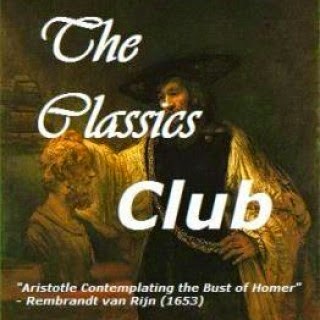Dead Souls by Nikolai Gogol
Rating: 3 out of 5
When I was younger (and I realize that this makes me sound way more decrepit than I actually am), I went through something of a Russophile period. (Yes, it's a real word, according to the Internet at least -- it means a person with a love of all things Russian.) I made attempts to read Dostoevsky and Tolstoy, collected books about Russia, and just thoroughly immersed myself in it. I grew out of it, as most of us grow out of our younger passions. However, even though the only Russian literature I ever managed to actually get through was The Brothers Karamazov and a few short stories of Tolstoy's, I maintained an affection for the genre (if it can be called that) that persists to this day.
I tell you all this by way of saying that I was truly excited when I learned that The Classics Circuit was going to be hosting a blog tour of Russian imperial literature, called "White Nights on the Neva." It seemed a perfect way for me to revisit my Russophile days of yore. For my review I chose an author whom I had heard of constantly -- Gogol -- and I chose one of his most famous books: Dead Souls.
Just a little biography that I found helpful: Nikolai Vasilievich Gogol (one thing that made me a Russophile was the names!) lived from 1809 to 1852. Dead Souls was published in 1842 when he was 33. He had been publishing for 11 years at that point, so he was something of a matured author when this book came out.
Unfortunately, I have to say that I was not particularly impressed with the book (at least on a first reading), even though I really wanted to like it.
My problems with Gogol started with the prologue to the book. In the prologue, he worries that he has not gotten his characterizations right, or maybe he has misrepresented what the decor of Russian manor houses is really like. So he takes great pains to beseech readers with special knowledge to help him with "fact checking" in subsequent editions of the book. This was off-putting to me, since it's not something that authors normally do. But then it occurred to me that Gogol is generally regarded as a humorist/satirist, and that he was probably carrying this to such an extreme purely for the comedic effect. However, it didn't feel like he was doing that (or else he was being extremely subtle and I was being extremely dense) so that started me off on the wrong foot with him. However, I am really not one of these readers that expects the author to do ALL the heavy lifting, so I trudged on.
The problem was, it didn't really get any better the more I got into the story itself. This is an early 19th-century novel, so I realize it's not going to read like James Patterson (and I say that as no real fan of James Patterson) but it's harder to relate to this novel compared to Dickens, for example. The premise is intriguing to say the least: Chichikov, the main character, arrives in a town and begins visiting all the wealthy landowers, for two purposes: 1) to impress them and make vital business connections; and 2) to begin his scheme of acquiring the "dead souls" of the title. These are serfs that have been accounted for on a landowner's census and other records, but they have died. The landowner is still essentially paying taxes on them, however, so Chichikov's scheme is to buy them and take them off the landowners' hands. His hope is to amass enough of these dead souls to gain some influence and power thereby, and be able to use them as collateral for buying his own estate. It doesn't end well, of course, and Chichikov is, as the old-timers say, "run out of town on a rail." The novel is incomplete and essentially ends at this point -- the most common explanation seems to be that Gogol thought better of his satire in his later years and tore up part of the manuscript. Other sources simply state that the manuscript was never completed.
Even though I could not really get into this book, it was easy to see that there were actually layers there, and that I was (by necessity) reading the book too superficially to really appreciate or understand it. Gogol apparently wrote this as a type of allegorical satire, and there are lots of clues that jump out at the reader from the very start. Chichikov appears to be a kind of Everyman, in one way, and that is reflected in Gogol's initial description of him:
In the britchka was seated such a gentleman -- a man who, though not handsome, was not ill-favoured, not over-fat, and not over-thin. Also, though not over-elderly, he was not over-young.
Later on, when Chichikov is trying to impress the various officials and landowners as he embarks on his scheme of wriggling into their good graces, the same motif pops up again:
So dazed was Chichikov that scarcely did he realize that the Governor was taking him by the arm and presenting him to his (the Governor's) lady. Yet the newly-arrived guest kept his head sufficiently to contrive to murmur some such compliment as might fittingly come from a middle-aged individual of a rank neither excessively high nor excessively low.
Each official and landowner that Chichikov visits has his or her own idiosyncrasies, and it's clear that Gogol enjoys lampooning these people as well. There is some genuine humor here -- it's just buried rather deeply at times.
Overall, I am glad I read this book, just to see what the fuss was about, but the main conclusion that I reached from it was that I need to read it again to get everything out of it that Gogol put into it.




